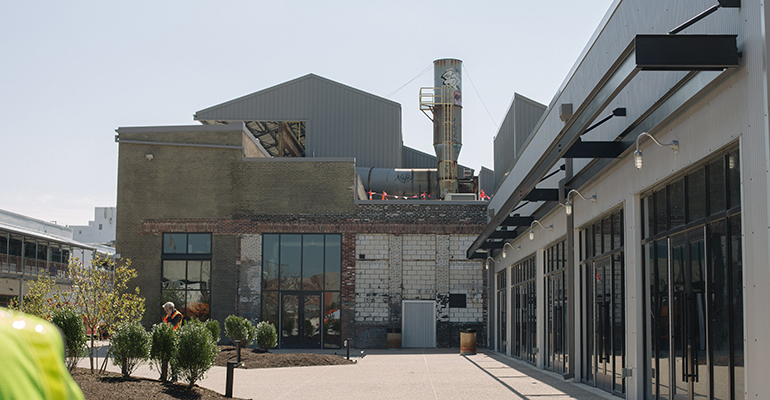Gerard Craft was one of the first restaurateurs to completely shut down his restaurants when the novel coronavirus pandemic struck. On March 16, the St. Louis, Mo.-based chef said that even doing takeout and delivery was too great a risk to his employees.
But he didn’t go out of business.
The operator of the seven-unit Niche Food Group had to keep Cinder House open because it was located in a hotel — the Four Seasons St. Louis — and he used his group’s resources to work with the North City Food Hub to provide free delivered meals to people in need.
But he also had other irons in the fire in the form of consulting work.
“There’s a lot of projects that still need to move forward, and they want as many people kind of thinking outside the box to make these things work and figure out what’s going to happen,” he said.
That includes ongoing work with The Four Seasons, as well as the St. Louis Football Club, the city’s soccer team, which is building a new stadium, and the Angad Arts Hotel.
 His latest project is a gig with City Foundry STL, a former factory for motors and generators that is being transformed into a food hall and public market, with Craft as its culinary director and consultant.
His latest project is a gig with City Foundry STL, a former factory for motors and generators that is being transformed into a food hall and public market, with Craft as its culinary director and consultant.
Craft said they’re reworking the project in the era of social distancing, making sure that, unlike in some food halls, there’s not a mad crush of people for lunch and dinner, but instead a steady stream of customers who aren’t just there for a meal.
“We’re taking it from the food hall more to the public market side of things, including things like a butcher, a cookbook shop that also teaches classes with the authors, a farmer with a stand, as well as restaurants,” he said.
They’re also working on City Foundry’s app, which will allow customers to order from any of the restaurants in the hall in a single order, and developing outposts in office buildings where all the meals ordered in the morning can be dropped off in a single delivery at lunchtime.
City Foundry STL is a former factory for motors and generators that is being transformed into a food hall and public market.
Craft said he and his team were doing some consulting before the pandemic, “and we’ve really doubled down on it during, because we want to keep as many people on our staff as possible, and keep our executive team busy. Because they’re essential to the business, but they need more [work].”
Ultimately Craft started reopening some of his restaurants, too, after exchanging ideas with other restaurant groups about the best ways to do business while keeping everyone safe.
“We’re going to have to deal with this forever,” he said of the novel coronavirus. “At some point we knew that we’re either going to have to operate or we’re going to die. Fortunately we were in a strong place where losing that much money [by closing in March] didn’t put us out of business, but that only goes for so long.”
 Craft changed his approach somewhat, requiring mask wearing and social distancing among other safety measures.
Craft changed his approach somewhat, requiring mask wearing and social distancing among other safety measures.
“The way I try to think of hospitality now, and the way that I talk to my team, is taking care of people: Making sure that people are safe. I think that by showing that you’re taking care of both your employees and your guests by having those rules in place and really taking it seriously is the strongest show of hospitality right now, even if there’s a handful of people who don’t get it.”
It’s a strange shift for people in the hospitality business to make, just as masks take some getting used to, he said.
“For years, masks have been a sign of danger. Someone comes up to you in a mask, you’re probably in a hospital or being robbed,” he said. “And now that has to be sign of safety. Like if someone’s wearing a mask, I feel safe, I feel warm, I feel good. And that just takes a minute [to get used to].”
Along similar lines, good hospitality now sometimes requires a sterner approach.
City Foundry's app will allow customers to order from any station in the food hall.
In hotels, even more than restaurants, “you’re so hospitality-driven and say ‘yes’ to just about anything,” he said. “We’ve been having to teach hotels how to say ‘no’ a little bit. You have to implement rules for these people even though that’s not normally the mindset.”
He said The Four Seasons actually had to hire two extra security guards for the patio to keep people in their seats and make sure they wore masks when they weren’t seated, “because it was so hard to control the first week they were trying to open.”
Craft said that reopening his restaurants during the pandemic gave him knowledge that, it turns out, other companies need and will pay him for.
 “Since we’re reopening our restaurants, we’ve already gone through these things. We have so much information and real-life experiences that we can give to people. And then training to make sure everyone understands why we’re doing it,” he said.
“Since we’re reopening our restaurants, we’ve already gone through these things. We have so much information and real-life experiences that we can give to people. And then training to make sure everyone understands why we’re doing it,” he said.
“We have one person on our team dedicated to safety practices. He’s been making sure that every restaurant that we’ve reopened is trained on all the safety standards and actually implementing them. Our CFO can think about the structure of a new restaurant business — what really makes sense with all the distancing and everything,” he said.
His culinary team can look at menus to see what’s cost-effective and possible in a socially distanced kitchen. His bar staff can develop strategies for pre-batching some cocktails and making other drinks easier to prepare during service.
Craft is a well-established leader in the St. Louis restaurant scene, but he said restaurant operators’ expertise are in demand.
“I feel like restaurants handled it probably better than any government organization at figuring out how to protect each other,” he said. “Obviously we’ve been really lucky with the position that our group is in, but I think a lot of it just comes from a conversation with somebody.
“Maybe you have a connection or know somebody at any of these [projects]. Sometimes it’s just about letting people know that you’re open to that service. Right now everybody’s really stressed out. And just saying, ‘Hey, you guys need help? Reopening or doing whatever, we’d love to be a part of it. We can figure out how to make the finance work, but we’d love to work with you.’”
Contact Bret Thorn at [email protected]
Follow him on Twitter: @foodwriterdiary





